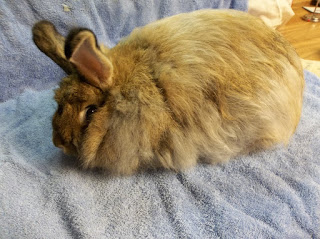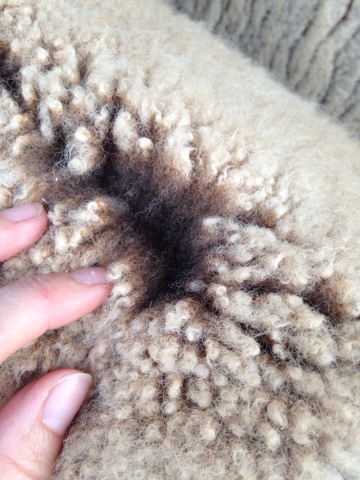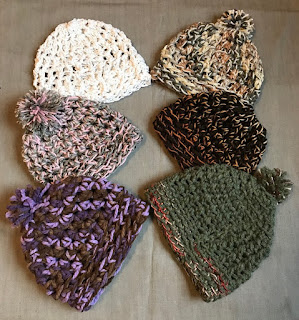This is not a super happy, everything wonderful post about raising rabbits for meat or raising angora rabbits for fiber.
It is more about me trying to make something work that wouldn't and why. But they may work for you! When we started out I always found reading homestead articles about what didn't work for a fellow homesteader actually helped me better than reading about why something worked wonderfully sometimes. So here is my homesteaders' journey with rabbits. Trying to raise rabbits for meat, then raising rabbits for both and raising rabbits for fiber.
Much like the goats, for four years we tried to make meat rabbits work out and we would have just enough success in between the failures to keep us going. Although, not enough pros for us to keep at it.
One of the major problems we had with raising meat rabbits was...well, we just didn't like them...
The meat was good and has a pretty good nutritional profile, But it was not good enough to put up with all the trouble of raising them! Here's a look at the meat from a nutritional standpoint Nutrition in Rabbit Meat
Reasons we didn't like raising rabbits for meat
The meat rabbits breeds we tried weren't enjoyable to take care of for us. Some were downright mean and would attack my hand if I reached in the cage!
We had problems with mothers not being good mothers! A major issue since unlike a goat I can't easily bottle feed a baby rabbit with much success! We had problems with mothers killing babies.
We had problems collecting the manure... the manure is great for the garden,, but its the urine that's stinky and really makes for lots of work if you're using trays or shoveling up urine soaked manure. The urine will burn plants so it couldn't be directly added either.
Also, we felt like they ate too much for the return on investment! They really go through the pellets and good rabbit pellets aren't cheap! They have very sensitive digestive systems and can be picky eaters. Which makes foraging and growing their food tricky. Though I did go that route for a while honestly I do not have time to devote an hour a day to gathering and growing rabbit food. That didn't make sense to me. I can simply take that hour and grow or gather food to be eaten directly for us.
Slaughtering them wasn't as easy as the youtube videos make it out to be! They kick, scratch and can fight fairly hard. They scream. It was pretty terrible and made me want to be a vegetarian!
Anyone who's says raising rabbits is easy or cheap to raise has clearly not done the numbers or maybe has no other livestock to compare them too. They are high input, though the right rabbits can also be high output if you have good breeders. Which apparently we never did!
I'm not saying they aren't useful livestock to many people!! They just were not the best choice for us and our personal needs on our homestead.
We don't give up easily and in those four years we tried 4 different breeds of meat rabbits... none lived up to the 'hype' of all we had read in those pretty glossy magazines.
Maybe if we had tried to raise them in tractors on the ground like this homesteader The Elliot Homestead that would have cut the feed cost although then I'd have to worry about moving the heavy tractors all the time so I don't know..
We tend to like animals that can be more independent like Meishan Pigs or Donkeys
New Plan for Raising Rabbits for Fiber or Both!
Then I tried Angora Rabbits! In 2013, I got into farm fiber production (raising it and spinning yarn) with the addition of the dairy sheep I tried (huge fail I might add,, but I was bitten by the fiber bug)
Fiber animals are as much work as a dairy animal and then some really!! For many many reasons, sheep didn't work out here. And neither did cashmere goats or angora goats...nor did alpacas work or llamas! I think the good Lord was trying to tell me something here ❓ Could be...
But late 2013 I got Angora Rabbits. Angora is probably my favorite fibers to crochet and wear.
After much research, I decided I would go for a dual purpose rabbit, French Angora. Raising rabbits for both meat and fiber sounded great! If this worked I wouldn't need to keep the American Blue or NZW or any of the other meat rabbits we had tried and didn't like! It would be perfect,, right!!!?? Right??? Oh... It's always so perfect in my head! 🤣
Angora Rabbits aren't really popular where I live so My very first rabbit was a French/English cross... It was love at first sight!!! I adored this guy. He was so sweet and SOFT!
I should have just accepted his wonderfulness,, got another English cross and been done... but...
The French Angora is said to be the nicest for fiber and meat.
So when I found some I went wild and bought several! (ok,, I bought way too many!)
however, they weren't quite as soft as my cross boy and really lacked the sweet temperament of my cross rabbit, which made harvesting the fiber not fun! You will often read how 'relaxing' people find grooming an angora rabbit is, well, it can be... if the rabbit is willing!!!! If the rabbit is not willing I promise its NOT a relaxing experience!!!
...and their ability to be 'plucked' made my life miserable with them!
You see 'pluckable' angora is considered the 'best' because its supposed to spin easier, shed less...so it brings more $ if you're selling it raw to other spinners...sounds nice right?
Problem: when its ready to be plucked you must pluck!.. if you're not there to pluck it for the next couple of days it all falls out and ends up in the stinky urine soaked manure! Not practical for this busy farm girl that has a huge priority for the gardens and other animals to tend too!
So for me, this was NOT the best type of rabbit!
This frustration was totally un-necessary for me to deal with.
The one thing French Angoras did well was making money! Their babies sold easily for high prices, unlike the meat rabbits. Of all the animals we've raised here, they were one of the top for making a profitable cash flow. I'll add I had pedigreed French Angoras and they brought the most and sold the fastest. They are not easy to care for and very time consuming but I did average an extra $200 to $600 a month with them. Nice side homestead hustle money. There are a lot of devils in the details to how I did it but it can be done for someone who enjoys raising and grooming angora rabbits. I know breeders of English Angoras who make a lot more. Pedigreed Angoras can be very profitable on many levels.
I also brought in German Angoras to see if they would work better They not pluckable and they give the most fiber of all the angora rabbits... they still grow fast enough to be an ok meat rabbit.. sounds perfect! Right?
Major problem... their fiber isn't as soft as the French or English Angoras, to me, it's downright itchy!
Plus again, they lacked a sweet temperament I wanted so I can groom and harvest the fiber with minimum drama! And honestly, at well over $100 plus for a rabbit, I was going to have a hard time culling them for meat!
So they were out... and in my disappointment and being in the middle of the overwhelming spring garden season I sold all my angoras to a nice lady in Gatlinburg.
We tried one more stab at meat rabbits (colored NZ) then gave them all up and turned their cages into brooders for baby poultry and for raising quail which did work better for us and you can read about that here Why Raise Quail?
What doesn't work for us might still work for you!
It can be hard when something fails you've worked so hard at especially when your dream homestead is so overwhelming at first! But take heart!! We are living proof many things do work out! True, they weren't the things we thought would work out but we feel so blessed and happier with the things that have worked!
So believe me when I say, this was not meant to be a discouraging post but one to make you think about it from a different perspective. So hopefully you'll be able to make the most informed decision possible and be saved of the frustrations we had!
For us, we've had alot of success (so far!) with Meishan pigs, Donkeys (to guard and for milk), four season gardens, and working miniature horses (for work, enjoyment, and milk(soon I hope)) I'll also add that my gardens never had enough fertilizer until I brought in equine! That is a major win since gardens are my main focus here!
If other livestock had been successful I would have never found my true love for equine or enough compost! yay! Win/Win 😄
Many other animals have actually worked here (geese, ducks, quail, which I loved) but we had to prioritize as our gardens have got more important so have my equine, and my husbands Meishan pig business took off. Homesteading simply just comes with hard choices sometimes.
Need more homesteader ideas to check out of Pinterest boards here Homestead and Horse Pinterest Boards
Like all other homestead plans, it's all, so perfect in my head.... ohhhh, and so perfect in the article where it does work out for others and in all the pretty magazines where sometimes the article is wrote by someone who doesn't even own that animal!
Not so perfect in my real homestead farmers life...
And that's ok,,, after all this is the Homesteaders Journey!
A Little More of our Journey
If you want you can now sign up for the feed notifier (side panel) if you want to make sure you catch all our posts. You can also sign up for our email list at the top of the page or at the bottom.I mentioned Meishan pigs above so for those who don't know here's a video about if they are a right fit for your farm since we have been on the subject of 'what's right for your homestead?'














